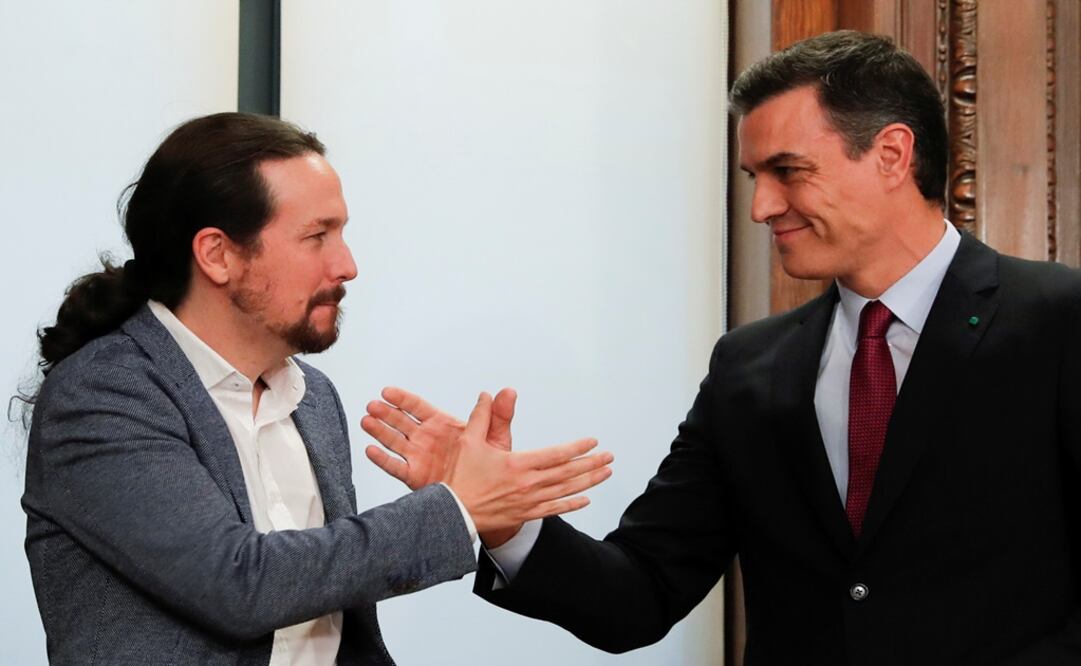Más Información

Sheinbaum destaca reducción en homicidios dolosos en lo que va de su gobierno; “es un logro de todo México”, afirma

Clara Brugada llama a no estigmatizar alcaldías que tienen más casos de sarampión; pide a medios manejar información con mucho cuidado

Aplican 14 millones de vacunas contra sarampión en el último año, reporta Salud; destaca esfuerzo coordinado

Juanita Guerra, entre el salón de belleza del Senado y señalamientos por hostigamiento a periodistas; esta es su trayectoria política

Hackeo al SAT, IMSS y Morena filtra datos de más de 36 millones de mexicanos; expertos advierten fallas estructurales en ciberseguridad

“Los mineros estamos de luto”: convocan a manifestación nacional tras hallazgo de trabajadores asesinados en Sinaloa; será el próximo sábado
Socialist leader Pedro Sánchez
narrowly won parliamentary backing on Tuesday for Spain’s first coalition government in decades, ending a long political stalemate but leaving him reliant on a fragile patchwork of alliances to pass laws.
He and coalition ally Pablo Iglesias , the leader of left-wing Unidas Podemos , now want to roll back some of the labor reforms passed by a previous conservative government and push for tax increases on high-income earners and companies.
But the two parties between them hold just 155 of the 350 seats in a deeply fragmented parliament , where antagonism between left and right was further inflamed by a deal the Socialists struck with Catalan nationalists to get the coalition voted through.
“I trust that we can overcome the atmosphere of irritation and tension and that we can recover space for consensus and for agreement ,” Sánchez told parliament prior to the vote.
The session was interrupted by shouts and insults, with politicians from the right accusing Sánchez of betraying Spain over Catalonia , whose independence drive has triggered a political crisis .
Catalonia: A long way to an unending crisis
In the run-up to the vote, politicians also accused each other of pressuring lawmakers, in particular from small regional parties that said they would back Sánchez, to change their minds.
But in the end, the vote to install Spain’s first coalition government since its return to democracy in the late 1970s passed off as expected.
Sánchez won the backing of 167 of the 350 legislators , while 165 voted against .
The remaining 18 abstained , including the lawmakers of Catalan separatist party Esquerra Republicana de Catalunya ( ERC ), after Sánchez agreed to hold a dialogue over the future of Catalonia and submit its conclusions to voters in the region.
Mainstream right-wing parties have steadfastly refused to hold any such talks on the future of Catalonia , where a botched independence declaration in 2017 led to the jailing of separatist leaders, galvanizing an at times violent protest movement.
The rise of new parties in Spain over the past five years has ended decades of dominance by the Socialists and conservative People’s Party over Spanish politics, making the process of forming governments and keeping them in power far harder.
The Socialists came first in two inconclusive national elections in 2019, and Sánchez has led a caretaker government that had little margin to push through policies. The minority government he previously headed was forced to throw in the towel after less than a year when Catalan separatists withdrew their support.
Portfolios in his new government have yet to be officially announced but will include Iglesias and Sánchez ’s Economy Minister Nadia Calvino as vice-presidents.
How the Socialists and Podemos will work together also remains an open question, as the parties were at odds for much of 2019.
sg
Noticias según tus intereses
[Publicidad]
[Publicidad]








